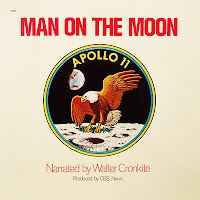On August 25, the world lost one of its titans, Neil Armstrong - a man singular in his defining accomplishment, as well as his refusal to live his life on anyone else's terms. His stark refusal to be caught in the spotlight for most of the last three decades of his life seems especially striking in an era of internet-driven overexposure of erstwhile celebrities. (It should be noted that refusing to take credit for his feats in space hardly set him apart as an astronaut: one would be hard pressed to find one who doesn't automatically credit his accomplishments primarily to countless engineers, mission control, and the other members of his crew.) Yet to call his list of accomplishments staggering would, if anything, be an understatement. Needless to say, he was the first man to set foot on the moon, and his deeply touching (if erratically delivered) "one small step for (a) man" quotation was heard live by 450 million people - more than 12% of the population of a world that was still widely devoid of radios and television sets. Often forgotten following what he did once on the moon, though, was his manual landing of the module on a site he had deemed safe on the spot while flying with less than 30 seconds' worth of fuel remaining in the tank. His legendary eight days aboard Apollo 11 also overshadowed a career in which he logged nearly 2500 hours in experimental aircraft for the Air Force and flew in both the Gemini 8 and 11 missions to space.
More recently, two years nearly to the day before his death, Armstrong made a rare decision to broadcast his feelings when he criticized the Obama administration for its decision to surrender the forefront of American space exploration to private firms. Speaking before the Senate, he described the contemporary state of NASA funding as one that "presents no challenges, has no focus, and in fact is a blueprint for a mission to nowhere." It is curious that spaceflight has been so thoroughly neglected over the past (precisely) forty years. For a government so long committed to profligate spending - the best record of any American president over the last 70 years in providing balanced budgets was Dwight Eisenhower, at 3 years out of 8 - what was once perceived as a tenet of national (and indeed, earthly) pride has been reduced to only 0.5% of our larger-than-ever national budget. I hope that Neil Armstrong's greatest legacy may one day be his having taken part in the resumption of American predominance in manned space exploration. For now, as a small tribute to a man I admire as much for his few, well-chosen words as his grace under fire, I have digitized the long out-of-print CBS LP Man on the Moon, which was narrated by Walter Cronkite and documents the history and journey of Apollo 11. It's a beautiful reminder of man's all-too-fleeting capacity for genuine, transcendent accomplishment. You can download it here.
Thursday, August 30, 2012
Subscribe to:
Posts (Atom)


